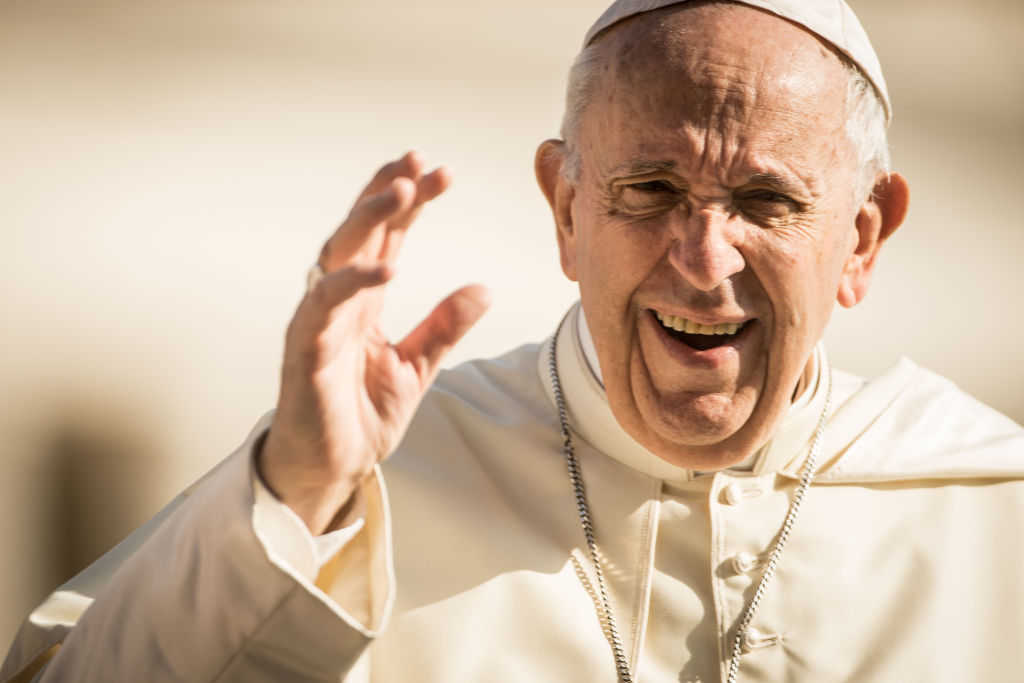North Korean dictator Kim Jong-un has invited Pope Francis to make an official visit to Pyongyang. The invitation will be personally delivered to the Vatican by South Korean president Moon Jae-in, himself a Catholic, who will be in Europe on official business next week.
It is a highly unexpected move, particularly as the Vatican and North Korea have no formal diplomatic relations and North Korean Catholics are routinely executed by state forces. “During the meeting with Pope Francis, [Mr Moon] will relay the message from chairman Kim Jong-un that he would ardently welcome the Pope if he visits Pyongyang,” said Mr Moon’s spokesman, Kim Eui-kyeom, according to the BBC.
Kim reportedly said that the Pope would be “enthusiastically” welcomed in North Korea should he accept the invitation.
“If the pope visits Pyongyang, we will give him a rousing welcome,” the dictator said, according to the New York Times.
According to the Christian persecution watchdog “Open Doors,” North Korea is currently the most hostile nation on earth for Christian to live in, with many being tortured and even executed for their faith.
“If Christians are discovered, they are deported to labor camps as political criminals or killed on the spot; their families share their fate,” the organization noted on its North Korea fact page. “Meeting for worship is almost impossible, so is done in utmost secrecy. The churches shown to visitors in Pyongyang serve mere propaganda purposes.”
When Pope Francis visited South Korea back in 2014, some 800,000 people attended a mass in Seoul during which the Pontiff pushed for the reunification of the two Koreas. At the time of that visit, a request asking the North Korea state-run Korean Catholic Association to send a delegation for the Papal visit was quickly declined.
According to NCR, the association did not object to the Pope’s visit, but instead took issue with a “joint U.S.-South Korean military exercise that started the very day of the reconciliation Mass and was scheduled to run for 11 days.”
The landmark invite comes after a period of warming relations between North and South Korea which culminated in a historic summit that took place earlier this year. Following that, in June, President Trump and Kim Jong-un met in Singapore – it was the first ever meeting between a sitting US president and the leader of North Korea.
According to the Independent, just days before the much-anticipated meeting took place between the two nations, Pope Francis said he had been praying that the summit would result in the “development of a positive path that guarantees a peaceful future for the Korean peninsula and for the whole world.”
Now, Secretary of State Mike Pompeo has once again traveled to the far east to lay the groundwork for a second summit between the two former sworn enemies. Pompeo noted that “significant progress” had been made towards North Korea getting rid of all its nuclear weapons.
.@SecPompeo had a good meeting with Chairman Kim today in Pyongyang. Progress made on Singapore Summit Agreements! I look forward to seeing Chairman Kim again, in the near future. pic.twitter.com/bUa2pkq80s
— Donald J. Trump (@realDonaldTrump) October 7, 2018
“It’s a long process,” Pompeo reporters in the South Korean capital of Seoul, after meeting with Kim in Pyongyang on Sunday, according to CBS News. “We made significant progress. We’ll continue to make significant progress and we are further along in making that progress than any administration in an awfully long time.”
Pompeo added that both leaders “believe there is real progress that can be made,” and that he is attempting to arrange the summit “at a time that works for each of the two leaders and at a place that works for both of them.”
“We are not quite there yet. But we will get there.”
According to North Korea’s state-run news agency, KCNA, Chairman Kim had “expressed his will and conviction that a great progress would surely be made in solving the issues of utmost concern of the world and in attaining the goal set forth at the last talks with the projected second DPRK-U.S. summit talks as an occasion.”
KCNA later called the talks “productive and wonderful” and noted that “mutual stands were fully understood and opinions exchanged.”



